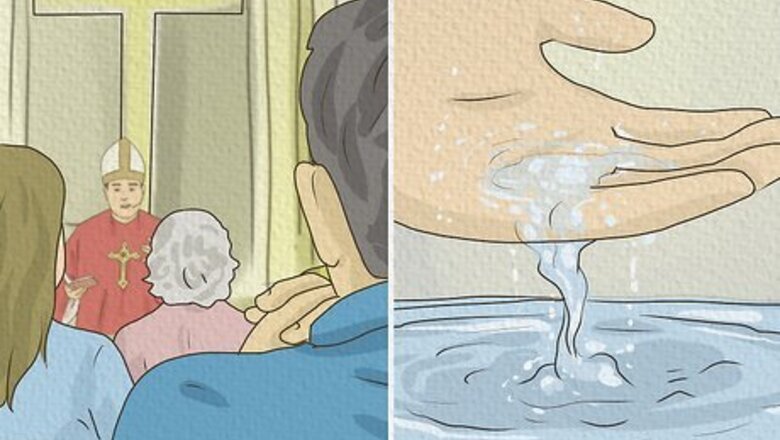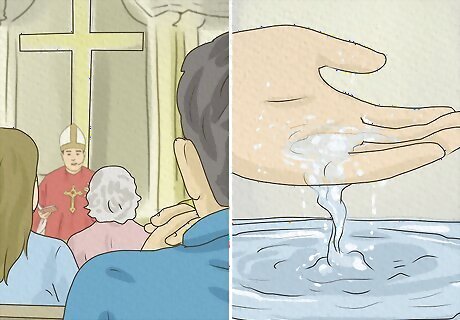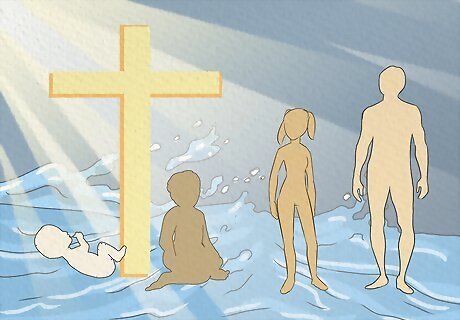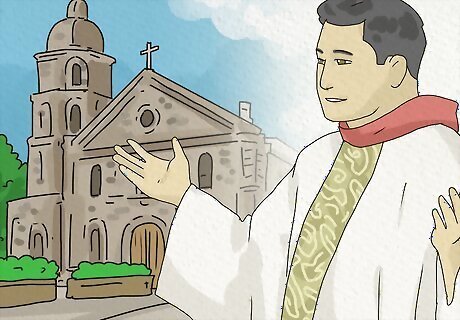
views
- During a christening, a child is given their Christian name in front of their church, family, and friends.
- At a baptism, someone is splashed with or immersed in water by a minister, cleansed of their sins, and rebirthed as a Christian.
- Anyone can be baptized, regardless of their age and if they were born a Christian. Typically only infants born into a Christian family get christened.
How are christenings and baptisms different?

Christenings name a child while baptisms initiate people into the church. While many Christians use these terms interchangeably, they have slightly different meanings. A christening is a ceremony in which a child is given their Christian name in the presence of the church, family, and friends. A baptism is a religious sacrament, or ritual, that initiates someone into Christianity. Typically, a minister uses water to baptize someone in the name of the Father, the Son, and the Holy Spirit. The water used in baptism symbolizes washing away your sins, which starts your new life as a Christian and follower of Christ. Many christenings also include a baptism, which is why the terms are sometimes used interchangeably. However, christenings don’t always include a baptism. Christening comes from the old English word christen, which means “to name.” Baptism comes from the Greek word baptizō, which means “to dip,” “to immerse,” or “to wash.”
What is a christening?

At a christening, you give your baby a Christian name. You typically have a christening at your church and invite your child’s godparents, family, and friends. During the ceremony, a minister might read a few selected passages from the Bible and then announce the Christian name you chose for your child. You don’t have to pick out a Christian name for your child to have a christening. During the ceremony, the minister can simply announce your child’s legal name. Godparents are relatives or friends who are baptized and devoted members of your church’s denomination.

Christenings are typically held for infants. You usually only christen babies because the ceremony is about revealing their Christian name and welcoming the new member of the family into the church. While christenings are usually performed when a child is born into a Christian family, an adult might have one to adopt a Christian name.

Christenings are more common in Anglican churches. Most Christian churches perform both christenings and baptisms, from Protestant to Lutheran denominations. However, christenings tend to be more popular in Anglican or Episcopalian churches. Christians in these denominations often refer to christenings as baptisms. Christenings are also considered a newer practice compared to baptisms. The origins of christenings stem from the 13th century CE.
What is a baptism?

At a baptism, you are reborn as an innocent person devoted to Christ. Baptisms are typically performed by a minister with your family, friends, and 1 to 3 godparents present. The minister usually reads from the Bible, says a prayer, and asks your godparents to promise to help you on your faith journey. Then, the minister forms a cross on your forehead and splashes or wipes your head with water, or fully immerses your body in water. As the water washes away your sins, the minister baptizes you in the name of the Father, the Son, and the Holy Spirit. Depending on your denomination, you might have 1 godparent, 2 godmothers, or be required to have a godmother and godfather. Some baptisms end by lighting a candle and saying a final prayer. While baptisms are typically done by the church, Catholics accept baptisms performed by anyone, Christian or non-Christian, if they splash the person with water and baptize them in the name of the Father, Son, and Holy Spirit. Baptisms are one of the 7 sacraments in Christianity. In Catholicism, you have to be baptized first in order to perform the other sacraments, like confirmation. According to most denominations, being baptized does not guarantee that God will save you, nor do you have to be baptized to be saved.

People of all ages and faiths can be baptized. Many Christian families choose to baptize their children when they’re babies, but there’s no age limit on baptisms. Baptisms can occur at any time during your life, whether you’re a child, teen, or adult. You also don’t have to grow up Christian to get baptized, as many non-Christians convert to Christianity by getting baptized. If you’re planning a baptism for your child, ask your church how old they need to be. While some denominations baptize children as young as 2 months old, others require that your child is old enough to profess their own faith.

Baptisms tend to be more common in Catholic churches. When you compare each Christian denomination’s preference for baptisms and christenings, Catholic families usually prefer to have baptisms. Baptisms themselves are held in almost all Christian churches and are regarded as highly sacred in your journey with Christ. Baptisms have a long history that actually started before Christianity. Jewish people in the 1st century CE practiced a water purification ritual called mikveh that John the Baptist likely used as inspiration for his baptisms.
Can you be baptized more than once?

In most Christian churches, you can only be baptized once. According to most denominations, there is no need to get baptized again because you already committed yourself to Christ and Christianity. However, some churches might re-baptize you if the rituals weren’t performed correctly at your first baptism. You can be both christened and baptized, as long as your christening didn’t include a baptism.
How are dedications different from christenings or baptisms?
Unlike a baptism or christening, a dedication is less formal. A dedication is a prayer or blessing for a baby during a church service. It doesn’t involve water or Bible readings and instead consists of you bringing your baby to the minister and asking God to bless you and your child. Many churches offer dedications during regular church services, which are usually done before the sermon.




















Comments
0 comment